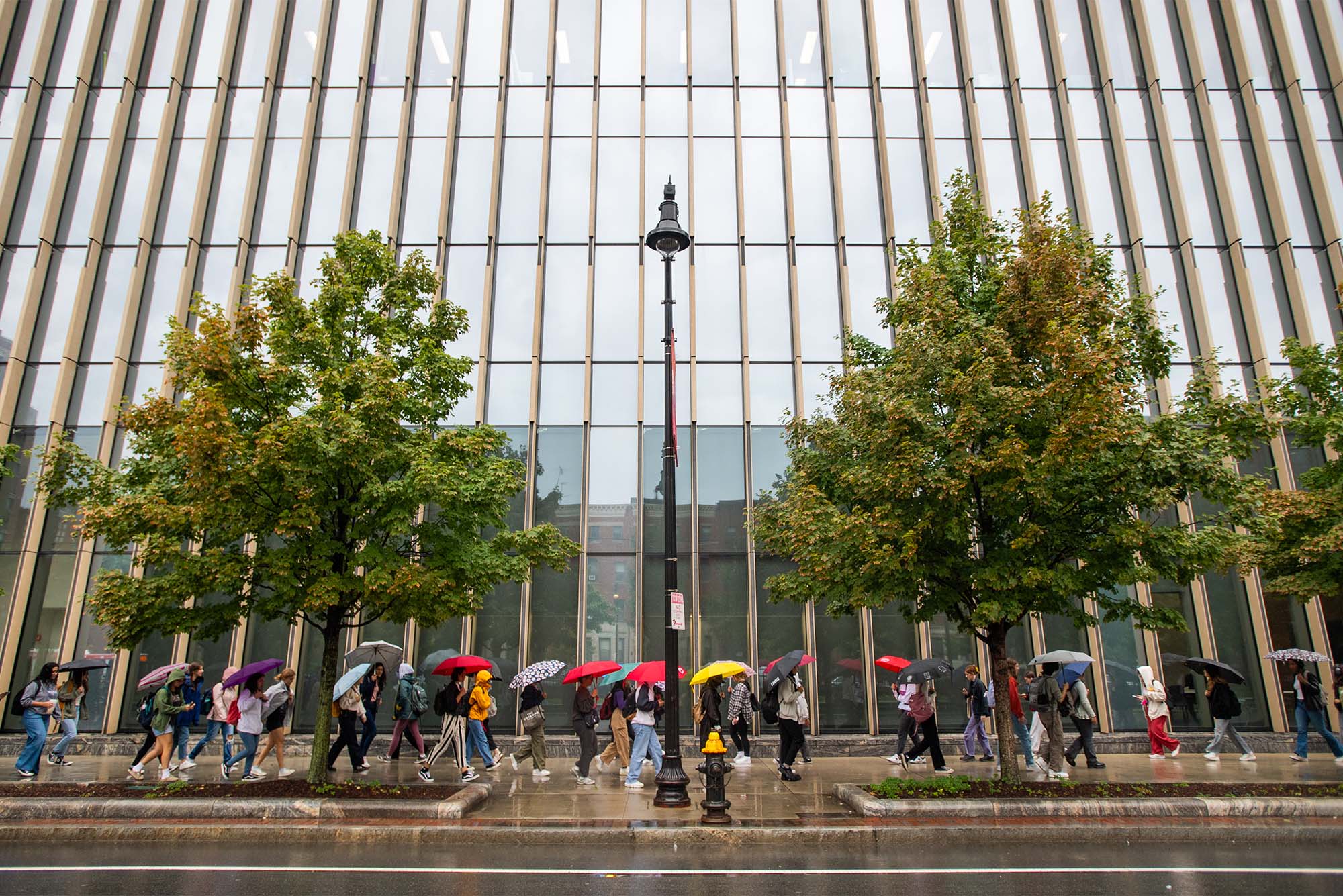We’ve Had 12 Consecutive Weekends of Rain. What’s Up with That?
The upside is that the summer forecast is looking good, says BU alum and meteorologist Christina Erne

This weekend’s forecast predicts showers and overcast weather—again—making it the 13th weekend of rain in a row.
We’ve Had 12 Consecutive Weekends of Rain. What’s Up with That?
The upside is that the summer forecast is looking good, says BU alum and meteorologist Christina Erne
If it feels like every weekend for the past few months has been cloudy or wet, or both cloudy and wet, it’s because they have. In Boston this spring, we’ve now experienced 12—likely going on 13—consecutive rainy Saturdays and/or Sundays. Contrasted with sunny skies and warm breezes during the week, it’s like Mother Nature is taunting us.
“It’s completely by chance that the rain falls on the weekends,” says one Boston University alum whose job these days is delivering soggy weekend forecasts. Christina Erne (COM’16) is the weekday meteorologist for the NBC 10 News early am show Sunrise in Providence, R.I. She says that there is no scientific reason for this unfortunate pattern—it’s just bad luck. (Every weekend in February also had either rain or snow. Enough, already!)
The wet weekends have dampened both spring festivities—including a drizzle over BU’s otherwise joyous Commencement—and moods. Boston Globe correspondent Ava Berger (COM’25) recently wrote that for some, the sound of rain provides a calming white noise, while for others, who want to venture outdoors, it can be depressing. Plus, the constant back-and-forth between sunny and gloomy can feel like whiplash.
According to Erne, now that we’re officially in meteorological summer (June 1 to August 31), there is hope for change. BU Today spoke with Erne to get to the bottom of this weekend weather phenomenon and to look towards, hopefully, a more pleasant summer.
Q&A
with Christina Erne
BU Today: Is there any explanation for the gloomy weekend weather patterns we’ve been experiencing?
Erne: It’s a totally random occurrence. But to understand why we’re seeing so much rain, we have to go back to earlier this year and last fall, when the Northeast was in a drought. We’ve been getting a lot of much-needed rain, because it’s basically the atmosphere’s way of making up for lost moisture so we don’t head into a summer that’s abnormally dry. This is something that happens; we go through abnormally dry stretches, and then we see abnormally wet stretches that make up for it.
BU Today: Has it been wetter than usual, or is that just our imagination?
Erne: Though it feels like these past few weekends have been complete soakers, we didn’t necessarily see a ton more rainfall than a usual spring: March had nearly normal rain, April had slightly below normal rainfall, and then May made up for that with above average rain. Most of the past weekends were gloomy days with just a tiny bit of rain, but I think that people are more hyper-focused on the weekends, because that’s our typical schedule for getting out.
BU Today: Are the periods of really wet and really dry related to climate change at all?
Erne: The extreme downpours and drought are related; with climate change, we see heightened extremes on both sides. You may have noticed last summer—and we’ll probably see it again this summer—that when it rained, it poured. That’s a product of climate change. When the atmosphere is warmer, it can hold more moisture. When it holds more moisture and a storm system passes through, it rains heavier. That’s why we typically see more flooding events due to climate change, and that’s why last year and the year before, there have been some incredible flooding events. Last year, Leominster, Mass., had 11 inches of rainfall in one single storm.
I will add that in a typical weather pattern for the Northeast, our rainiest months are March, April, and May, and then we start to dry out. So it’s not all unusual that we’ve seen so much rain, because those are our typical rainiest months. When a storm bubbles up for just a day or two and then moves right out, like we’ve been seeing, that means the jet stream is just chugging along in a healthy way. This shows us that there are no stagnant areas of low pressure, and nothing sitting or spinning across the area—it’s just the jet stream pattern, but the weekend weather pattern is an unfortunate series.
BU Today: What do you expect this summer to bring?
The summer outlook, I will say, is a lot drier. It looks normal. It looks warm. We’re still going to get extremes, like we could see flooding and heavy rain events. But it looks like things are balancing out; not as cool, or as wet, as it has been. There is the potential for some areas to get really hot with slightly above average temperatures. So I would expect some pretty hot days, and probably near normal rain.
This interview has been edited for length and clarity.


Comments & Discussion
Boston University moderates comments to facilitate an informed, substantive, civil conversation. Abusive, profane, self-promotional, misleading, incoherent or off-topic comments will be rejected. Moderators are staffed during regular business hours (EST) and can only accept comments written in English. Statistics or facts must include a citation or a link to the citation.